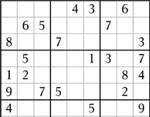Su doku swan-necking
To intervene or not to intervene? The dilemma faced by a su doku swan-necker…


During the delightful experience that was the tube strike last week, I was packed onto a bus with half of London and, by the sound of it, half of Europe too. Many of my fellow passengers were decreasing the precious little space between us by attempting to plan their route via the use of voluminous A to Zs, for which there really wasn't enough elbow room, and by craning their necks to catch sight of any useful landmarks to guide them. 'A park!' cried one in delight. 'What park?' asked her companion. 'Big park?' she replied hopefully.
However, my attention was caught by the passenger directly to my right (with left elbow lodged in my abdomen), who was doing the su doku. The reason my attention was so firmly captured by this activity was that I could see they had just made a crucial mistake.
This threw me into a terrible dilemma. It would of course be terribly presumptuous, offensive even, to lean over and point this out, yet it would be sheer torture to watch them proceed optimistically, only to falter a few squares from completion, aware that there was a problem somewhere but unsure where they had gone wrong.
In her wonderful book Watching The English Kate Fox admires the English people's determination to shut out their fellow passengers while on public transport ? we may, particularly during last week's strike, be so close to them physically that we are practically merging, but it is criminal to acknowledge this forced intimacy.
We adopt a number of methods to convince ourselves that we are in fact alone: the blessed ipod, enclosing us in a different aural world; a newspaper or book to hide behind; or absorbing activities, such as the crossword or su doku.
I am not blessed with a particularly mathematical brain, as anyone who has attempted to teach me maths will attest to, but I love the logic of su doku; it is incredibly soothing, a safe cocoon where every number has its place, and every grid has a solution. If only everything in life could be so neatly slotted away into little boxes.
It was therefore really rather upsetting to watch someone going wrong in their su doku, like watching the first fragments of scree bouncing down the mountainside before the avalanche follows. But my sheer Englishness prevented me from intervening; it would be rude, intrusive, patronising to point out the fatal error.
Exquisite houses, the beauty of Nature, and how to get the most from your life, straight to your inbox.
I suffered all the way from Green Park to South Kensington, as more bewildered tourists and long-suffering commuters squeezed onto the top deck around us. Eventually, my su doku pal realised that the solution was now out of reach and, in despair, discarded the paper entirely. My heart went out to them, and to the confused mass of boxes, a third of them left untouched, and four wicked 7s jostling for space in the middle column.
Country Life is unlike any other magazine: the only glossy weekly on the newsstand and the only magazine that has been guest-edited by His Majesty The King not once, but twice. It is a celebration of modern rural life and all its diverse joys and pleasures — that was first published in Queen Victoria's Diamond Jubilee year. Our eclectic mixture of witty and informative content — from the most up-to-date property news and commentary and a coveted glimpse inside some of the UK's best houses and gardens, to gardening, the arts and interior design, written by experts in their field — still cannot be found in print or online, anywhere else.
